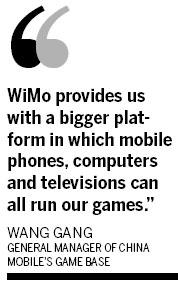China Mobile has caught up with its US counterpart AT&T's push toward three-screen integration, by launching a technology similar to Apple's AirPlay.
The mobile phone might become the Swiss Army knife of the information age, as it can be a credit card, a calculator, or a home entertainment console, instead of merely being a phone call gadget, said Wang Jianzhou, chairman of China Mobile, the world's largest telecom carrier.
Wang's company has recently cooperated with 12 industry players to launch world-leading technology, which allows people to transmit high quality images, video or 3D games from a mobile phone to other electronic appliances, such as computers or televisions.
The technology, which is called Wireless Mobile Multimedia Transmission Protocol, or "WiMo", may kick-start a new era of cell phone applications, said Bill Huang, general manager of China Mobile's Research Institute.
Using WiMo, people can display cell phone pictures, documents, or videos on televisions without any time lag, according to Huang.
Enjoying mobile phone games on TV is an achievable target, too.
As more Chinese people want to share games with their families, mobile devices will serve as games consoles such as the Xbox and Wii.

In 2008, the US-based telecom giant AT&T came up with an idea for "the integration of three screens": the TV, the PC and the wireless device. The company is planning to deliver content and services to consumers across all of the three screens, according to AT&T's website.
In November, Apple Inc launched AirPlay, a technology that allows Apple devices, including iPhone, iTouch and iPad to send images and videos over a WiFi system to Apple TV.
"We cannot make the size of cell phones any bigger, because people should put them into pockets," Huang told China Daily.
The issue of screen size may cause problems; when the era of mobile Internet arrives, along with diversified mobile phone applications posted online, people may sometimes find the experience is not good enough when viewing on a small screen.
"WiMo will help them gain a better experience, and the technology makes the convergence of three screens (mobile phone, television and PC) come true," Huang said.
China Mobile's launch of WiMo is a strategic move which may bring substantial business opportunities, as it will extend China Mobile's influence from the wireless sector to the larger electronic appliance industry, according to some analysts.
The company has just finished national distribution to nine business bases, covering a variety of content areas including a wireless music base in Chengdu, Sichuan province, a mobile reading base in Hangzhou, Zhejiang province, an e-commerce base in Changsha, Hunan province, and a mobile video base in Shanghai.
Guo Xiaoyan, deputy head of the terminals department at the China Mobile Research Institute, said WiMo technology will complement these nine bases, since the use of WiMo means content can be seen on televisions, as well as phones.
Guo said at present people have to attach an external device to their cell phones in order to use WiMo.
However, built-in chips with a WiMo function will be developed in early 2011, and these WiMo-added mobile phones, and even tablets, are expected to hit the market next year.
Sources from China Mobile said a WiMo-added phone might cost customers a few more hundred yuan, compared with regular devices.
Wang Gang, general manager of China Mobile's Game Base, which is located in Jiangsu province, said WiMo will help in Game Base's further development.
"WiMo provides us with a bigger platform in which mobile phones, computers and televisions can all run our games. And I think it meets people's demand," Wang said.
Harry Man, a partner at the venture capital firm Matrix Partners China, said that as China has more than 800 million mobile phone users, the market will be big enough for WiMo.
"It is possible that shipments of smartphones worldwide will surpass personal computers in 2012," Man said.
"The smartphones may take a more dominant position in the future, and the possibility that mobile devices will control computers and televisions is growing."





